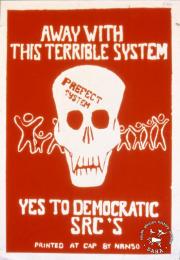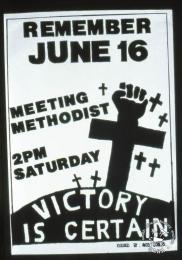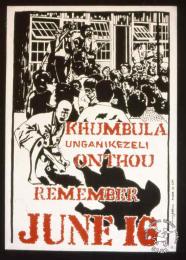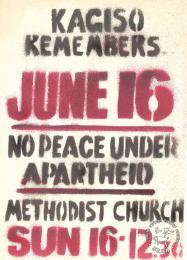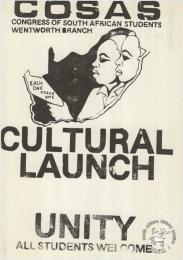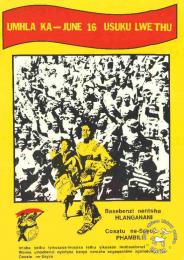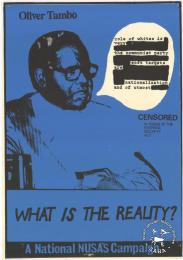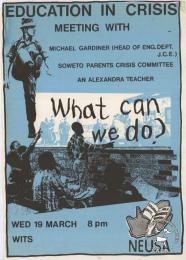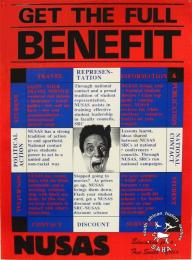[For more information on individual posters, click or hover over images]
On 16 June 1976 secondary school students of Soweto decided that they would not submit to the imposition of Afrikaans as a medium of instruction. They had also had enough of racist and inferior education. Under the banner of the 'Action Committee' of the South African Students Movement (SASM) pupils organised a protest march. Groups from the different Soweto schools gathered and moved towards Orlando stadium to hold a mass meeting. Units of the South African Police moved in swiftly, firing live ammunition. This protest and the resulting deaths marked the beginning of an uprising which spread rapidly throughout South Africa; hundreds of school students were killed. Education had become a terrain of violence, and has remained so.
Education
Segregated schooling has been fundamental to apartheid education policy. When the white Nationalist government steered the Bantu Education Act through parliament in 1953/1954, their intentions were clear:
I will reform education so that Natives will be taught from childhood that equality with Europeans is not for them.
Hendrik Verwoerd
We should not give the Natives any academic education. If we do, who is going to do the manual labour in the community?
JN le Roux
Each one, teach one...
The events of 1976 were not merely local protests against inadequate schooling. The uprising spread so rapidly throughout the country precisely because it was directed at an educational and political dispensation which had oppressed black people for over a quarter of a century.
The commemoration of 16 June became a central focus of resistance in student and youth politics in South Africa. The youth of the 1980s, the 'young lions' of the townships as they dubbed themselves, forged their political consciousness in the schools of the post-1976 period. By 1985, 16 June had become a de facto public holiday, reluctantly called Soweto Day by the white establishment, and officially proclaimed South African Youth Day by the liberation movement inside and outside the country. The posters of the 1980s continually affirm the significance of this day for students and youth throughout the country.
In strategic terms, the events 1976 brought to the fore the central contradiction which was to shape and dominate educational politics in the 1980s: this was the conflict between the inferior education provided in separate schools for black children by the state, and the progressive education demanded by, and increasingly practised by, organised students, parents and teachers.
The Congress of South African Students (COSAS) was formed in 1979. It was to become the largest mass-based student organisation South Africa had ever seen. By August 1985, when COSAS was banned by government decree, it had mobilised a support-base of hundreds of thousands of secondary school students spread across 71 branches nationwide. There is no doubt that COSAS played a significant role in the period from 1980 to 1985: its networks, organisational structures and the popular support it commanded politicised many thousands of people, carrying the message of national democratic struggle into townships everywhere.
On the education front, COSAS's programme of action sought to achieve dynamic, free and compulsory education for all. The organisation was in the forefront of educational protest, consistently demanding the abolition of the harshest features of black education — inferior and segregated schooling, poor facilities, textbook shortages, exclusions of students for political reasons, age limits, corporal punishment, sexual harassment and the like.
COSAS was the driving force behind mass educational struggles of the first half of the 1980s, but other organisations also made important contributions to the democratic movement in this period. Two of the most prominent were the National Union of South African Students (NUSAS), and the Azanian Students Organisation (AZASO), which was later to change its name to the South African National Students Congress (SANSCO).
AZASO concentrated on organising black students at tertiary institutions, and established branches at universities, teacher-training colleges and technikons throughout the country.
AZASO structures were pivotal to student resistance on black campuses. They highlighted the authoritarian educational practices and apartheid-oriented curriculae which characterised these institutions. On the mainly-white campuses such as the University of the Witwatersrand (Wits) and the University of Cape Town (UCT), AZASO powerfully articulated the grievances of black students who experienced particular difficulties and inequalities at these institutions.
NUSAS concentrated most of its energies on winning the active support of white students at English-medium universities. In recent years, however, it has managed to establish a presence on some Afrikaans campuses as well. NUSAS campaigns tended to focus on bringing struggles of the factories, townships and rural areas onto campus. It advocated the need for a less eurocentric and more politically critical content in university courses in all faculties. Much of the media and other propaganda produced had an impact far beyond NUSAS, as it was often used in educational activities of other organisations such as COSAS and AZASO.
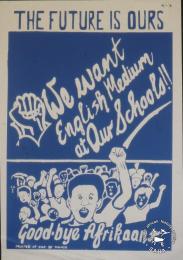 Most activities undertaken by COSAS, AZASO and NUSAS were reactive, and characterised by protest action. However, the Education Charter campaign taken up by these three organisations in February 1984 actively expressed a need —widely recognised by student leaders at the time — to formulate concrete alternatives to apartheid education. During 1984 and early 1985 all three student organisations worked hard at popularising a campaign to draw up an Education Charter. By the end of 1984, the progressive teachers' union, the National Education Union of South Africa (NEUSA), had joined the alliance.
Most activities undertaken by COSAS, AZASO and NUSAS were reactive, and characterised by protest action. However, the Education Charter campaign taken up by these three organisations in February 1984 actively expressed a need —widely recognised by student leaders at the time — to formulate concrete alternatives to apartheid education. During 1984 and early 1985 all three student organisations worked hard at popularising a campaign to draw up an Education Charter. By the end of 1984, the progressive teachers' union, the National Education Union of South Africa (NEUSA), had joined the alliance.
The Education Charter was conceived of as an elaboration of the Freedom Charter's assertion that 'the doors of learning and culture shall be opened'. It aimed to put forward a detailed view of a viable alternative to apartheid education. A specific aim of the Education Charter campaign was the creation of a document around which students could organise.
When it joined the Education Charter campaign, NEUSA was relatively small. In the early 1980s it ran subject workshops for teachers and built programmatic alliances with student organisations. By 1985 significant numbers of teachers throughout the country began to actively identify with the anti-apartheid struggle. NEUSA experienced a rapid growth in membership in the Eastern Cape, Transvaal and Natal, and similar progressive teacher associations were launched in the Western Cape — the Western Cape Teachers Union (WECTU), and the Democratic Teachers Union (DETU) — and in the Border Region the East London Progressive Teachers Union (ELPTU).
Despite these developments, a serious impasse arose during 1985 in the struggle against apartheid education. Student organisations had come to rely too heavily on the boycott tactic. Schooling was at a standstill. While this was testimony to COSAS's political power, it dispersed students onto the streets and made further, more constructive organisation virtually impossible.
The declaration of a State of Emergency in July 1985 and the subsequent banning of COSAS only served to exacerbate the problem. There was talk of 1986 being a year of no schooling. Many students spoke naively of 'liberation before education', which caused widespread alarm in the townships.
During September, representatives of all sections of the Soweto community met to discuss possible solutions to the growing education crisis in the township. They formed the Soweto Parents Crisis Committee (SPCC), which represented a new form of political organisation in the education terrain. For the first time ever, an alliance of parents, teachers and students was established to tackle problems in education. The SPCC achieved widespread support throughout Soweto, and the establishment of parent-teacher-student alliances was soon on the national agenda.
With this in mind, an historic national education conference was convened in Johannesburg in December 1985. The National Education Crisis Committee (NECC) was launched at this conference. It adopted the slogan 'People's Education for People's Power' to express the strategic objective of future educational struggle. The conference resolved to call on students to return to school immediately, while continuing the struggle for proper education.
At a later conference, held in March 1986 in Durban, this call was reiterated, with a resolution that people's education programmes should be implemented immediately. Progressive educational organisations have successfully drawn attention to the problems of education in South Africa, and have made significant contributions to the process of working out possible solutions. But the black education system remains in crisis.
A recent government report proposes compulsory primary school education for children of all races, but retains existing apartheid-created inequalities in teaching and resources, within a supposedly non-racial framework. Indeed, rather than open up under-utilised white schools to relieve over-crowded and dilapidated township schools, the government plans to close them down. The government continues to evade taking the only rational course — that of integrating education — by developing elaborate procedures for modifying the present system.
Meanwhile, hundreds of thousands of black children continue to receive inadequate education with few prospects.




